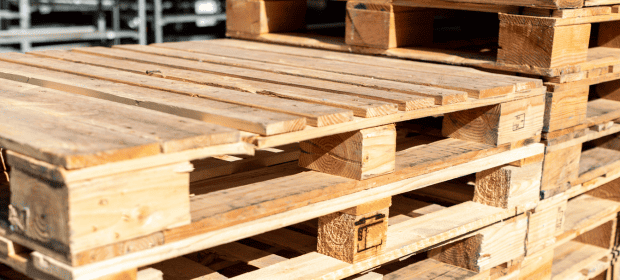Wooden pallets are essential in the world of logistics and warehousing. They provide a cost-effective, efficient, and environmentally friendly means of transporting and storing goods. However, many people overlook the proper storage and maintenance of wooden pallets, leading to premature wear, safety hazards, and increased expenses. In this blog, we will explore the dos and don’ts of storing wooden pallets to ensure their longevity and safety.
Dos of Storing Wooden Pallets
1. Keep pallets in a dry, well-ventilated area
Moisture is the enemy of wooden pallets as it can lead to mold, rot, and weakening of the wood. Store your pallets in a dry location with good air circulation to prevent damage whether that’s in a secure warehouse or a covered outdoor yard.
2. Stack pallets on a level surface
Uneven stacking can lead to warping and instability. Always place pallets on a flat and level surface to maintain their structural integrity.
3. Regularly inspect pallets
Routinely check your wooden pallets for signs of damage, such as broken boards, loose nails, or splinters. Damaged pallets can be a safety hazard and should be repaired or replaced promptly.
4. Rotate pallets
If your pallets are in long-term storage, it’s a good practice to rotate them regularly. This will help prevent prolonged pressure on specific pallets, reducing the risk of warping.
5. Store pallets away from potential hazards
Keep your pallets away from heat sources, chemicals, and sharp objects. Storing them near hazards can lead to premature damage and compromise the safety of the pallets.
6. Store pallets off the ground
If possible, elevate the pallets using pallet racks or blocks to prevent contact with the ground. This helps to avoid moisture absorption and reduces the risk of pest infestation.
Don’ts of Storing Wooden Pallets
1. Don’t expose pallets to extreme weather conditions
Prolonged exposure to rain, snow, or direct sunlight can degrade the wood’s quality rapidly. Whenever possible, store pallets indoors or under a shelter to protect them from the elements.
2. Don’t overload pallets
Each pallet is designed to carry a specific load capacity. Exceeding this limit can lead to pallet failure and pose a significant safety risk. Check the manufacturer’s guidelines for the maximum load capacity of your pallets and adhere to it strictly.
3. Don’t ignore safety guidelines
Make sure all employees handling pallets are familiar with safety procedures. This includes proper lifting techniques, wearing appropriate personal protective equipment, and following proper stacking procedures.
4. Don’t use damaged or broken pallets
Using damaged pallets compromises the safety of your goods and employees. Always remove damaged pallets from circulation and either repair or dispose of them properly. Learn more about how to properly dispose of your wooden pallets in our recent blog titled Consider the impact: disposing of pallets.
Proper storage and maintenance of wooden pallets are essential to ensure their longevity and safety. By following the dos and don’ts outlined in this guide, you can optimise the lifespan of your pallets and reduce the risk of accidents in your warehouse or storage facility. Remember that wooden pallets are a valuable resource that can be reused and recycled, so taking care of them not only benefits your operations but also the environment. By being proactive in their care, you can save on replacement costs and contribute to a more sustainable supply chain.

